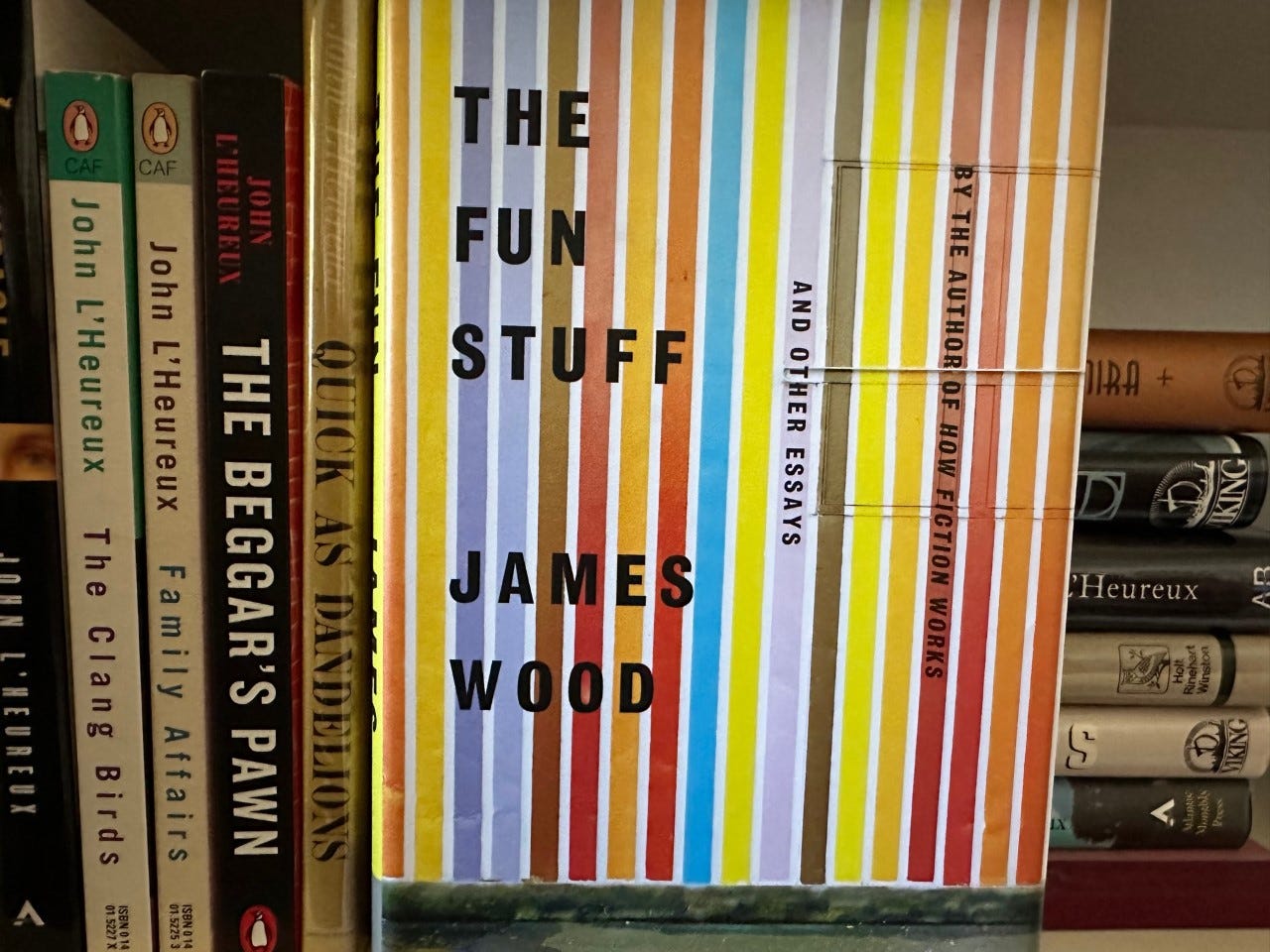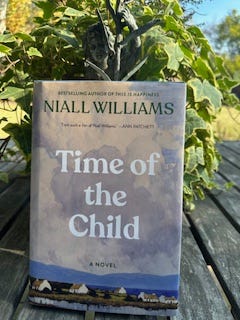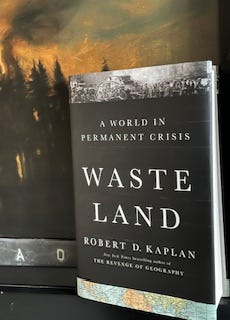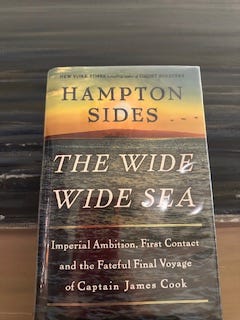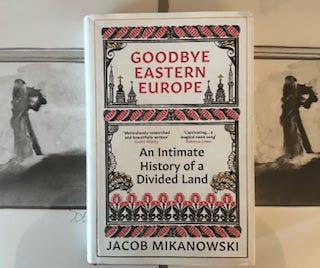Newsletter: from 1/25 on ...
Literature as antidote ...
I am writing a newsletter after months of existential tossing and turning. It is time to resume my duties. However, before we get to books & company, a little context may be required. (NOTE: nothing new in any of this)
Climate change is relandscaping our world. Trump is remodeling if not dismantling our over 400-year experiment in representative government (NOTE: it began with the first colonial legislatures). Technology continues to separate us from each other and the vital quotidian of our daily lives. While I am allergic to hyperbole, I must admit that my personal history has not felt so many seismic tremors all at once. (I try hard to separate it from the jarring act of getting older). In every case the traditional FIGHT or FLIGHT response fails. Climate is universal as is the pace and scale of technology’s rewiring of human life. There are Trumps everywhere and where there are not, there are different versions of failing and ailing states. Meanwhile, the few islands of stability are only penetrated by the plutocrats and oligarchs of our perilously unequal world. So much for FLIGHT … as for FIGHT … Where do we gather? Who do we champion? The failure of the liberal experiment in all corners of our world has left us leaderless and bereft of vision. The wars fought on the foothills of WOKE discredited and thus seriously weakened our allegiance to both our democratic and Democratic ideals. The fight must be reimagined and must contain within it a recognition of how fundamentally conservative and religious this nation is and always has been.
If this is a partial snapshot of the MACRO of my monkey brain at 4:00 in the morning, the question is where I find relief. It is NOT in ANY of the news outlets and the multitude of alternative platforms. It is NOT in the increasingly saturated and diluted world of PODCASTS. Though exceptions to the rule exist daily, I mostly want to escape the NOISE. I do believe that we are all living in an endless Whack-A-Mole loop of soundbites, clickbait and notifications. Again, I am not impervious to it and, at times, contribute. Like the New York City subway, it is loud and fast, and I cannot avoid it, but I do not want it as my daily soundtrack. That is the role of literature and its many subdivisions ranging from novels to poetry to theater to historical non-fiction to biography and memoir. Literature provides a refuge for the mind in these unnerving times, a place where the comforts of perspective and thoughtfulness are close at hand. Over the past several months my literary wanderings have been marked by the following:
1. The comfort of the sublime … the granular condition of the world outside the lovely and comforting confines of family and friends is too often harsh and hysterical. The center (my communal version of it) struggles to hold. Confusion and anxiety feel too omnipresent. Thus, I am drawn to the BIG PICTURE of sublime literature for perspective and the hope that comes with it. Great literature captures the confusion and anxiety in our human lives and through the beauty of language and all the tools of fiction reformulates it into the calming elixir of the universal. A recent production of “Our Town” in NYC, despite its earnest but awkward bows to WOKE, reminded me of the myriad ways this timeless play illuminates what is “eternal”. Whether in the rocks, the graveyards or the stars, our daily struggles are simultaneously ennobled and arrested by Wilder’s ironic and dry dance with time and space. If this play were a tonic, I would drink it with my favorite gin every night. The week before the play, I was waiting for a physical therapy appointment and picked up an old edition of “The Atlantic” and read Patrica Lockwood’s homage to Virginia Woolf’s To the Lighthouse. I later learned that Lockwood’s extraordinary essay was used as an Introduction to a recent Penguin reissue of Woolf’s timeless novel. I taught To the Lighthouse to high school seniors and read it annually for several years. It remains enthroned at the top of my desert island list; however, it had been over thirty years since I read the twin sister, Mrs.Dalloway. For the next couple weeks, I was revisiting Clarissa on the day of her society cocktail party. It was an immersion into the sublime at levels few writers achieve but most courageously try to. With its echoes of a changed and changing world, Mrs. Dalloway, framed by Lockwood’s essay, provided, through Woolf’s extraordinary language, a shot of metaphysical sustenance and artistic grace so badly needed in these mindless times.
When I use sublime in this context, I am referring to literature that is in equal measure timeless and beautiful. There is nothing I have read in recent years that can compete with Woolf’s twin sisters; however, many have drunk from the waters. Recent publications include: Small Rain by Garth Greenwall, Orbital by Samantha Harvey, The Time of the Child by Nial Williams, We Burn Daylightby Brett Johnson, James by Percival Everett, Absolution by Alice McDermott and Martyr by Kaveh Albar. Opening up the lens a bit, over the past five years, the following novels are the real thing and remain intact as candidates for that very short list: The Passenger & Stella Maris by Cormac McCarthy, This Is Happiness by Nial Williams, Foster & Small Things like These by Claire Keegan, Crossroads by Jonathon Franzen, The High House by Jesse Greengrass, The Overstory by Richard Powers, and Klara and the Sun by Kazou Ishiguro .
(NOTE: Before moving on to non-fiction, I must repeat that the best book nobody has read is Thomas Flanagan’s first book in a remarkable Irish trilogy … The Year of the French, published in 2004. It is historical fiction that is as poetic as it is revelatory. Find the hardback edition.)
2. The Bracing Tonic of History … history in its different shapes was my first literary companion as I began to anxiously navigate the world. In the beginning it was military history – an enthusiasm that remains even if it suggests “issues”. It soon evolved into simple biographies and grand stories. For much of my adulthood, this early passion only grew, finally directing me to twenty years teaching American History (and Literature). Since retiring ten years ago, history continues to be a tutor and a cryptic oracle, serving as a tonic to hysteria and our human vice of presentism. Recent non-fiction publications have stuck with me and have provided the relief that comes with fresh insights and “big picture” perspective.
Robert Kaplan’s current book, Waste Land (A World in Permanent Crisis), is a coda of sorts to his recent opus, The Loom of Time (Between Empire and Anarchy, from the Middle East to China). The former layers the themes of the latter into our current time. The subtitles of each say it all. Kaplan is not a doomsayer, and these books are not jeremiads. Both books are too long in different ways and verge on the pedantic; however, there are nuggets throughout and a very persuasive narrative. Kaplan is a realist and his world is geopolitics. He has lived it as much as he has studied it. He is a serious, literate man with serious things to say. Using history and his life as a journalist as his sources, Kaplan shapes not only his own compelling narrative but makes all too clear how important historical narratives are to the world whether formed by empire or the great “men” of history. Kaplan’s historical perspective puts us clearly within the context of history’s wheelhouse. Reading Kaplan, particularly Loom of Time, provides the comfort, albeit a bit chilly, that our moment is nothing new in history though its particulars might be. If the template exists for how we got here, maybe we can learn from it enough to discover our way out … maybe.
A less bracing version of literary history is the story well told. While David Grann has been stealing the show of late with his gripping and revealing rewrites of history, The Wager and Killers of the Flower Moon, my recent favorite is the Wide Wide Sea by Hampton Sides. A retelling of Captain Cook’s ill-fated third voyage did not appeal to me on the surface, but it was on too many lists to be ignored. I inhaled it. Sides tells the story so well and what a story it is. I promise you it will surprise from the beginning to the end. Quite literally, the world will not look the same. I don’t want to spoil any of the reveals … and that is the point. Sides takes a worn narrative and gives it life and relevance. It makes you wonder how many such sad hand-me-downs are lying in the vast closet of our minds.
The last of recent journeys is the most original. Goodbye Eastern Europe (An Intimate History of a Divided Land) by Jacob Mikanowski is darkened a room illuminated with hundreds of candles. Writing history with the ear of a poet, Mikanowski literally lights up a part of the world, a CENTRAL part of the world, that usually lies in our mind’s shadows. Goodbye Easter Europe created a New World for me. Like the movie “Pleasantville”, the black and white opaque images of Eastern Europe are now replaced with the colors and varied histories that were always there. It is also a complex and too often tragic story of competing narratives and the forces that are required to protect them and the consequences of denying them.
Finally, books that I have returned to in the last months and thought about include several that I have banged the drum on before. They include:
*Hare with the Amber Eyes … this literary gem seems to get more relevant each year.
*Global Crisis (War, Climate Change and Catastrophe in the Seventeenth Century) … the subtitle says it all. I wrote extensively about this opus a few years ago and believe it to be even more relevant today. History provides playbooks and the 17th century in Global Crisis is one.
* The Restless Republic (Britain without a Crown) … talk about history rhyming … the English Civil War, what led up to it, what it created and how it ended, has many of the elements that have rocked our country for the past seventy years. It puts paid to the idea that Britain’s long history is rock of stability compared to ours. It also has, by history’s sobering standards, a “happy” ending.
* saving the best for last … The Inevitability of Tragedy (Henry Kissinger and His World). Everyday something happens, a thought emerges while reading, someone says something, and I think about this book. It IS about Kissinger but also equally about those who shaped his world and his increasingly prophetic take on ours.
Thank you for reading …


